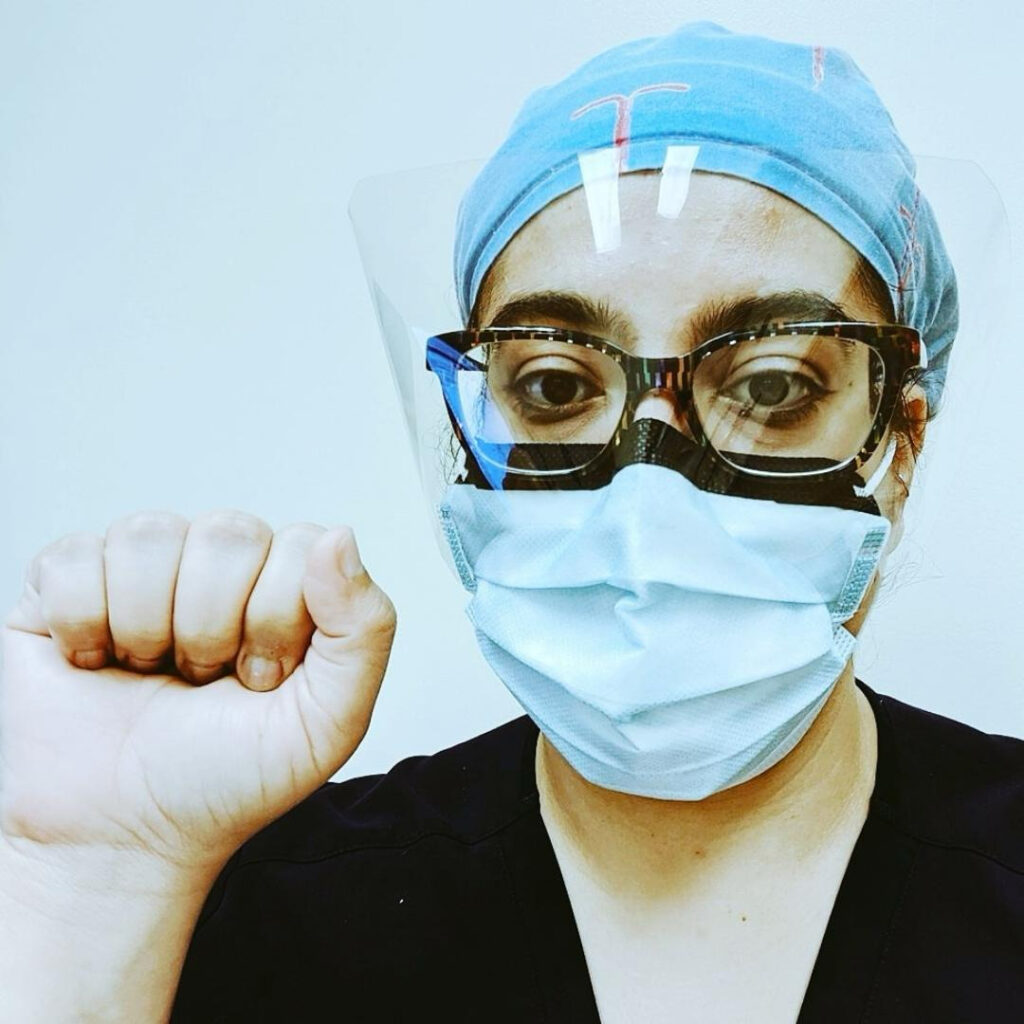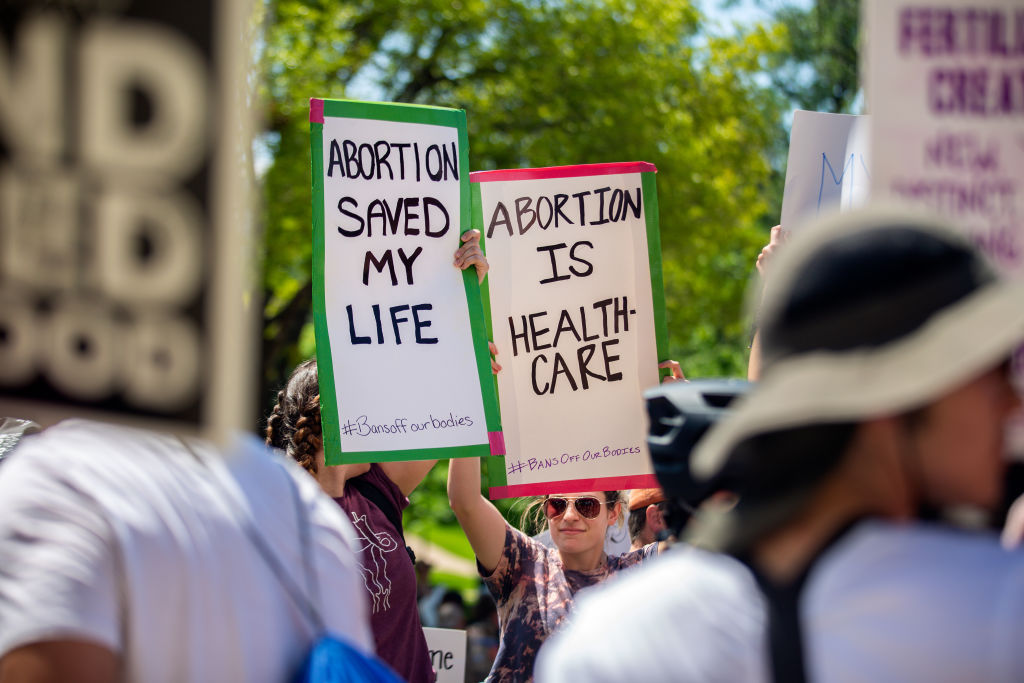"I'M HERE AS LONG AS I CAN BE"
Texas abortion provider Ghazaleh Moayedi, D.O., provides care for her neighbors—but she has to leave the state to do it
By Susan Rinkunas
After Ghazaleh Moayedi graduated college, she got a job working on the administrative side of Whole Woman’s Health, an abortion clinic in Austin, Texas. She respected the providers who chose the work—many of whom had witnessed illegal abortions before Roe v. Wade—but also thought the patients deserved doctors who looked like them. “I didn’t have the language for it at the time,” she says “But I noticed these doctors, older white men, didn’t reflect the people that we were taking care of. I knew that we needed new doctors.”
So, she went to med school and became an OB/GYN and complex family planning specialist in Dallas in 2018. Less than two years later, Texas lawmakers enacted abortion bans, first during the height of the pandemic, and then via the 2021 bounty hunter law known as Senate Bill 8. A few months later, Roe fell, and now Moayedi travels to Kansas to provide abortions—often to other Texans. I talked to her about what she’s doing to care for people after they return home, and her message for people living in Democratic-led states who think they’re safe from abortion bans.
Susan Rinkunas: When did you start traveling to provide abortion care?
Ghazaleh Moayedi: I started traveling to Oklahoma in 2020 [after] Gov. Greg Abbott shut down abortion care in our state under the guise of COVID restrictions. Abortion doctors traveling is common—but never from a state like Texas to somewhere else. That is the novel piece over the last few years. It’s always a doctor who lives on one of the coasts traveling to a restrictive state. That was a moment where I was like, ‘Oh, crap. In order to take care of Texans, I’m gonna have to start traveling.’ I started working at a couple of clinics there, in addition to the clinics I was working at in Dallas, and did that until Oklahoma shut down—it was about a month or so before Dobbs. Now, I am traveling to Kansas and working in a clinic there.

You’ve said it’s surreal to be a Texan leaving the state to care for other Texans leaving the state. Are you commiserating with patients? Do they know you’re from Texas?
I usually ask people when I make small talk when I’m doing an ultrasound. Like, “Where are you coming in from?” And people usually say Texas, then I ask where. “Oh, where in Dallas? I’m from Dallas, too, that’s why I’m asking.” I can just see people’s faces change. When I say, “Did you eat at that place? That place is really good,” I can see the light coming from people. It’s a moment for us both. We’re like, “Yeah, this is bullshit. It’s totally bullshit that we’re both here.” I had a patient who was like, “I wish you could have just done my abortion in the closet at this restaurant that we both knew.”
During a fall trip to Kansas, two of my patients were on the same flight I took. I’ve still been really processing that in and of itself, that we’re all on this flight together, how just stupid, pointless, [and] inhumane this is.
Are there certain patients you can’t stop thinking about?
I’ve had patients whose partners have lost their jobs because of the time they have to take to come and travel. There’s a ripple effect of harm that happens from people needing to travel to get abortions.
When someone does a medication abortion [as Dr. Moayedi sometimes does for Texas patients in Kansas], there are rare cases where it doesn’t work. If I’m seeing them in Texas for an ultrasound afterward but there’s still a continuing pregnancy, it’s like, “Shit, you’ve gotta go out of state again.” I can’t do anything for them, and it’s unconscionable. Before [Dobbs], someone would show up a week after their medication abortion, and I could be like, “Yep, everything looks good” or, “Nope, it didn’t work. Okay, I can do an aspiration right now for you.” Now, it’s a never-ending saga.
In other states [like Kansas], it’s “take your medication abortion, and then in five weeks, take a pregnancy test.” Some of these people are waiting five weeks to be able to fully confirm that their abortion is complete. Not only did they have probably several weeks of waiting to get an appointment, get out of state, then do their pills, then come back—but now they’re going to have to wait another month to know that it’s complete. This is like a two-month minimum cycle in someone’s life of just trying to end this pregnancy.
I’m definitely seeing people making that calculation [about medication abortion] in their mind of, “Wait, then I have to wait to know that it’s done?” They’re so stressed out—they had to do all this travel—that they’re like, “I’m just gonna do a procedure [instead] so I can leave here knowing.” You take good care of them, but states are taking people’s autonomy away, and they’re being forced to make decisions out of this insulting process.
And you’re providing ultrasounds in Texas now?
After a Dallas abortion clinic closed in spring 2023, I started a little ultrasound practice so that, at least for folks in my general area, people don’t have to wait five weeks [to find out if their pills worked]. They can get an ultrasound with a trusted provider who isn’t going to judge them and who has deep experience in abortion care.
People really need a community-based provider that they can turn to when they come back [from an out-of-state abortion], someone that they can trust and talk to. It sucks not being able to provide abortions [in Texas]. But it is this whole new chapter of my work. It feels really good to still be able to take care of people in the ways that I legally can.
I mean, folks are going to crisis pregnancy centers for ultrasounds before and after abortions because they’re free. People are able to schedule appointments with me via Pegasus Health Justice Center. I have a cash rate that’s $250, but I’m working with abortion funds, and pretty much everyone is able to get funded.

Have you thought about leaving Texas?
There isn’t such a thing as a safe state. We are one country, and these types of tactics are coming to every state. This mentality isn’t concentrated here [in Texas]. It exists in states without abortion restrictions as well. But people have this false belief that they are safe in these bubbles, and even within states like California and New York, the [anti-abortion] mentality exists. This extreme right, fascist, white-power movement exists everywhere, and abortion restrictions are an extension of that—they’re not separate from it.
After the Dobbs decision, I was feeling really low, even though we knew it was coming. It was like, “What the hell am I gonna do?” I considered moving and told my friends. I started looking at Zillow everywhere, like, “What’s New Jersey like? What’s Michigan like?” I interviewed for a few jobs in other states, and that was a couple of months of pouting and wondering what I was going to do. But I’m not going to escape from white supremacy anywhere in this country. I can move somewhere else and have a little bit more leeway in my work, but until when? We might have a president that is literally presidenting from jail.
Right, there could be a national abortion ban in January 2025.
Exactly. The reality is, I could pick up and move my whole family, and we could go somewhere “safe” for a period of time—and then what? I’m here as long as I can be. I think the idea that this is concentrated [in Texas] is really short-sighted. Everyone has a role to play in combating white supremacy and fascism within their own communities.
There’s a ripple effect of harm that happens from people needing to travel to get abortions.
What do you think of the talk online where people urge doctors to defy hospital orders and perform abortions in health emergencies?
It makes me incredibly annoyed and pissed off. That’s not how hospitals work. It’s not like I can just waltz into an operating room and say, “I am ready to do a surgery now.” Even when any hospital I worked at allowed it, there were still often multiple hoops I would have to jump through. Sometimes, even though it met all of the policy guidelines, there was someone who delayed the case because they needed to talk to someone who needed to talk to someone.
Doctors don’t own the hospital. We don’t actually direct anything in the hospital or schedule cases. There are multiple layers of people that have to approve things and even once it is approved, financially and policy-wise, you can still show up on that day and your anesthesiologist refuses, the nurse refuses, the tech refuses. I can’t do it alone in a hospital. I
could go to jail. I could lose my medical license, and then who am I going to help?
And rather than suggesting medical providers flout state laws, there are people organizing community networks for abortion pills, like Red State Access.
What pill networks are doing—that’s envisioning the future and being the future that we want and doing the work that needs to be done at the community level. That is how we change culture. That is how we address people’s needs in the moment, and we live out the future that we want. We’re saying we don’t need the courts to let us live the free lives that we can have. We actually have autonomy over ourselves.
That is, on all these micro levels and within communities, what people need to be doing: envisioning and living within the just future that we all deserve.